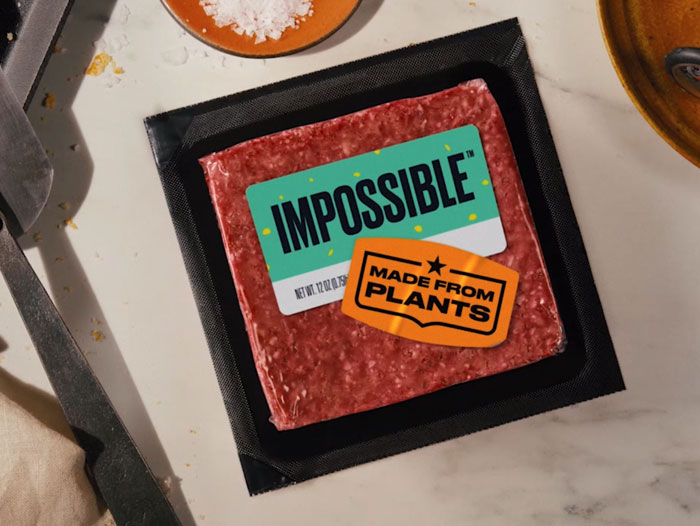Impossible Foods Launches First National Advertising Campaign, “We Are Meat”
April 13, 2021 | 6 min to read

REDWOOD CITY, Calif.– Impossible Foods is launching its first national advertising campaign as the leading food tech startup accelerates growth and takes advantage of mounting economies of scale.
The campaign, titled “We Are Meat,” features TV spots with the meaty, mouth-watering images and salacious sizzle of the company’s award-winning burgers. Produced by Portland, Ore.-based Wieden+Kennedy, the advertisements proudly and unapologetically claim that Impossible Burger, which contains no animal ingredients, is meat for meat lovers — made from plants.
The concept challenges the notion that meat must come exclusively from animals. Impossible Burger, which contains no animal ingredients, animal hormones or antibiotics, tastes like beef and is hailed as a triumph of food engineering — the result of nearly a decade of research and development.
“We are investing in a nationwide campaign to show Americans that Impossible products deliver the whole delicious, meaty experience people crave — without the disastrous environmental toll of livestock,” said Impossible Foods CEO and Founder Dr. Patrick O. Brown. “We can replace yesterday’s ridiculous, animal-based technology with a categorically better way of transforming plants into meat. And we can do it with zero compromise on taste, nutrition, convenience or family traditions.”
The first national integrated campaign for Impossible Foods kicks off today with US television, digital, and social elements including five TV spots: “We Love Meat,” “Meat Places,” “Yes We Do, “Mmmmmmmmmm”, and “300%”.
The ads specifically target meat eaters who haven’t yet tried Impossible products. (Nine out of 10 people who eat Impossible products today are meat eaters.)
“Once people try Impossible Burger they are blown away by its taste. But consumers are skeptical based on years of sub-par experiences with conventional, plant-based products. We built this campaign to introduce Impossible products to consumers nationwide as delicious meat — no qualifications or compromises needed,” said Impossible Foods’ Senior Vice President of Marketing Jessie Becker.
Watch the TV ads here.
Rocketing Retail
The company’s largest marketing campaign comes after a year of blockbuster growth for Impossible Foods.
Impossible Burger was sold in about 150 grocery stores one year ago; it’s now available in more than 20,000 grocery stores nationwide — a more than 100X increase in Impossible Foods’ retail footprint. Production has increased sixfold since 2019, both in Oakland and at multiple plants owned by co-manufacturing partners.
Impossible Burger is now available at Albertsons, Kroger, Publix, Safeway, Sprouts, Target, Trader Joe’s, Walmart, Wegmans and many others, as well as online platforms including Amazon Fresh, Walmart.com, Kroger.com, Farmstead and Imperfect Foods.
Impossible Burger’s success comes largely at the direct expense of ground beef from cows. In September 2020, 72 cents of every $1 spent on Impossible Burger came at the direct expense of animal-derived products— a “displacement rate” of 72%. By March 2021, Impossible Burger’s displacement rate was 82%. The company’s goal is 100% displacement.
To drive new levels of trial and repeat purchase, Impossible Foods recently cut suggested retail prices by 20% for grocery stores throughout the United States. The latest price cut — the third double-digit cut in the past year — brings the company’s suggested retail prices for Impossible Burger to $5.49 for patties and $6.99 for a 12-oz. package. (On-shelf prices may vary depending on location and retailer.)
The price cuts are the direct result of growing demand and economies of scale for Impossible products. The company plans to keep cutting prices until it undercuts the average price of commodity ground beef from cows — an achievement possible within the next couple of years, Brown said.
Mission matters most
Already considered the world’s No. 1 environmental startup, Impossible Foods’ mission is to help solve the planet’s climate and extinction crises. The company is helping to turn back the clock on global warming and restore biodiversity by making the global food system sustainable.
Impossible Burger has already started to displace sales of animal-derived foods, whose production is one of the biggest generators of greenhouse gas emissions and the leading driver of the global meltdown in wildlife, and, compared to animal meat, Impossible Burger requires a tiny fraction of the world’s precious resources to produce.
About Impossible Foods:
Based in California’s Silicon Valley, Impossible Foods makes delicious, nutritious meat and dairy products — with a much smaller environmental footprint than meat from animals. The privately held company was founded in 2011 by Patrick O. Brown, M.D., Ph.D., Professor Emeritus of Biochemistry at Stanford University and a former Howard Hughes Medical Institute investigator. Investors include Khosla Ventures, Bill Gates, Google Ventures, Horizons Ventures, UBS, Viking Global Investors, Temasek, Sailing Capital, and Open Philanthropy Project.
